Religion through the eyes of Russian students
The article presents a generalized description of the semantic content of the concept “religion”, characterizing the everyday consciousness of students in the Russian regions. It is compared by a number of main features with similar indicators of reflection of religion of the youth of the Russian regions, obtained by the authors a year earlier. A set of previously tested and new indicators of assessment / interpretation by students of the religious “domain” of social reality is analyzed. The cognitive characteristics of the attitude towards religion, its emotional and evaluative parameters, as well as indicators of the respondent's involvement / distancing in / from religious life are presented. Based on the results of a quantitative analysis of student survey data (quota-nested sample, N=578, 2024), conclusions are made about the dominance of neutral-positive evaluative contexts of religion over negative ones in the consciousness of student youth; on the prevalence of transcendental and meaningful-life interpretations of religion by students with parity of “secularist” and “desecular” contexts of its assessment; on a significant (more than half) degree of students' involvement in various modalities of the religious “field”. The article specifies the empirical interpretation of a number of basic concepts and defines the directions of substantive development of the program-instrumental complex of research.
Figures
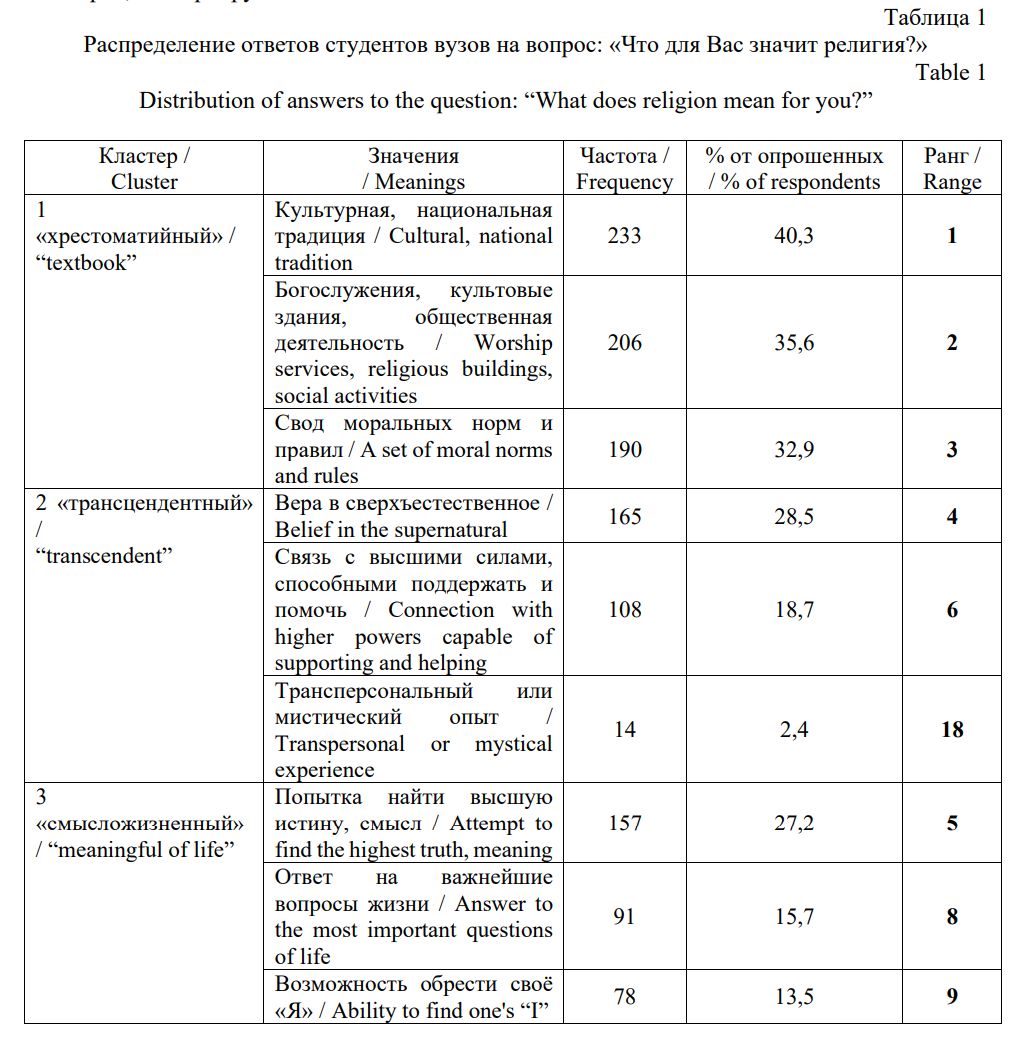
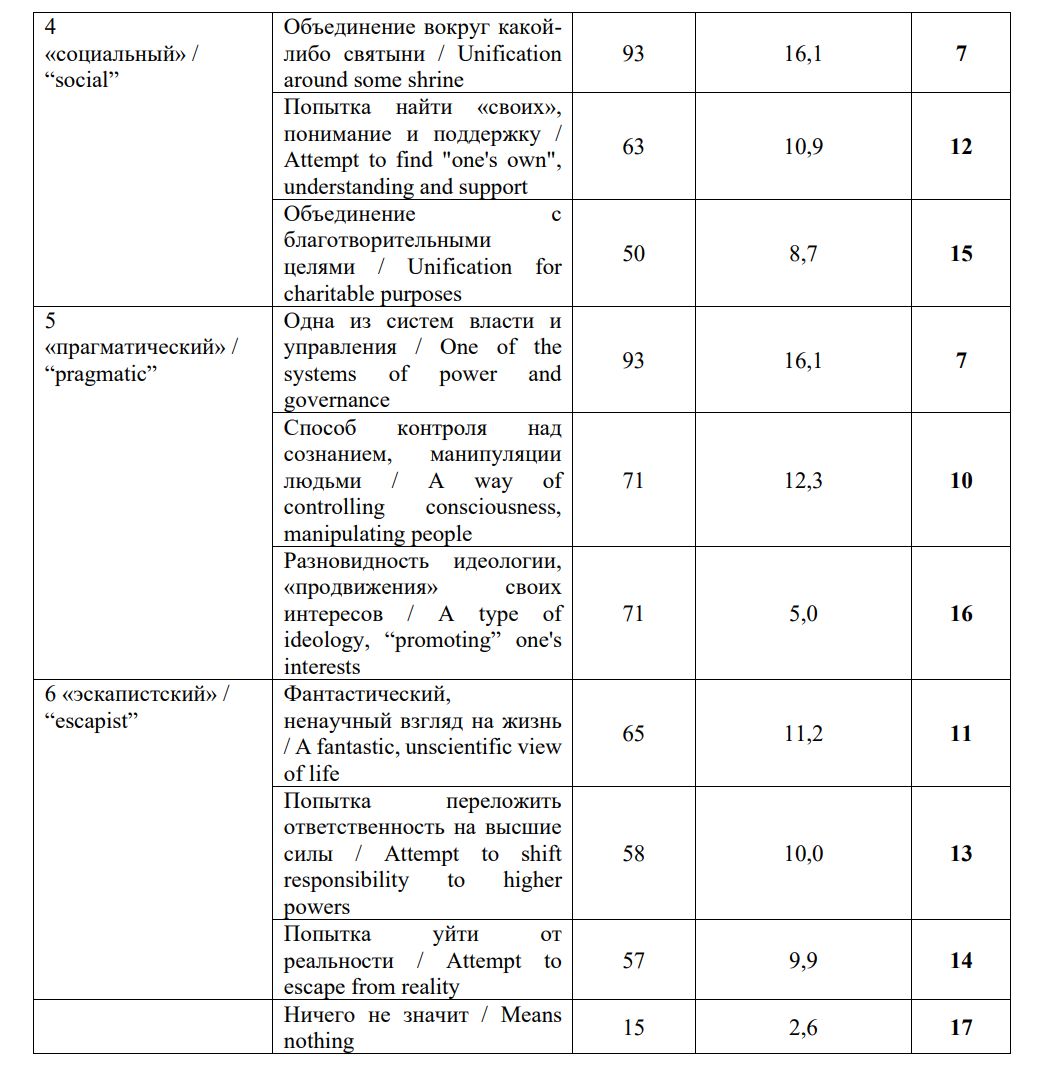
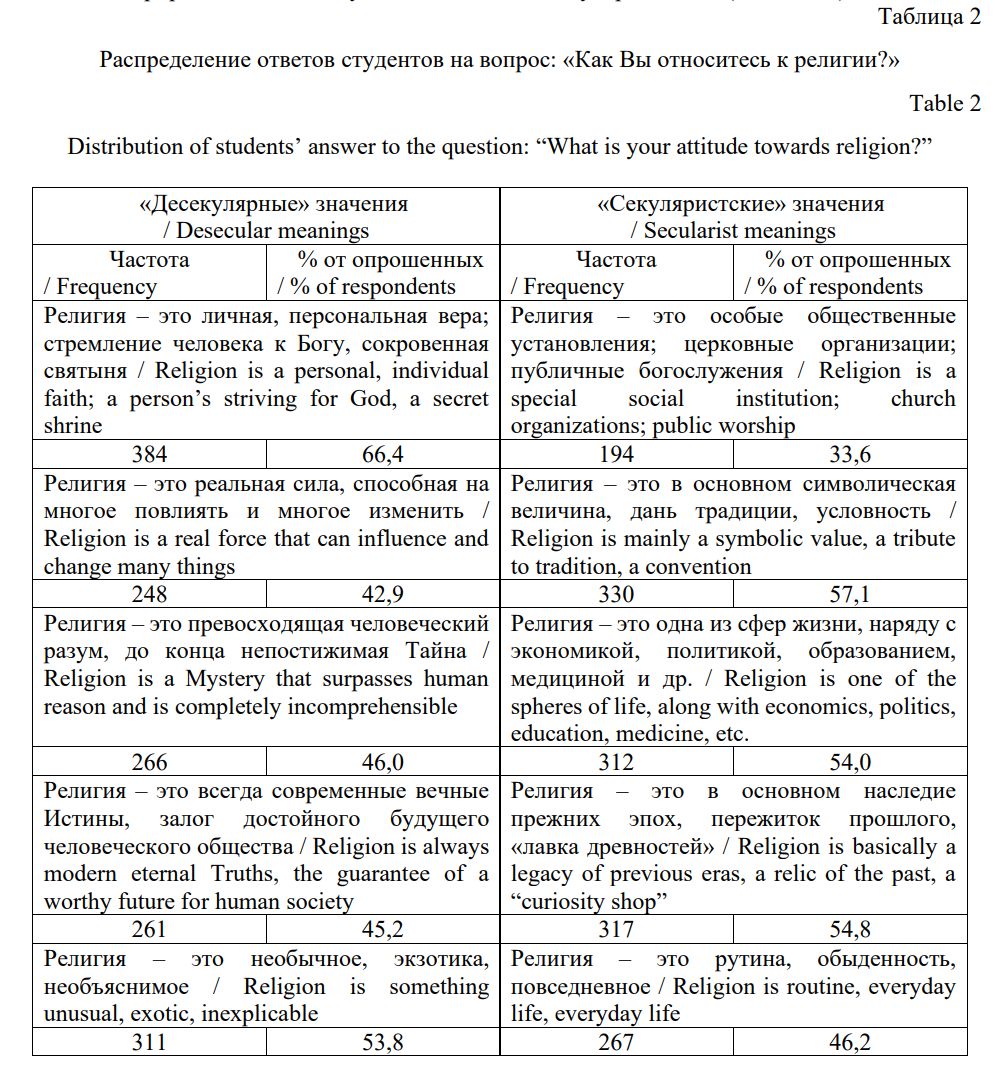
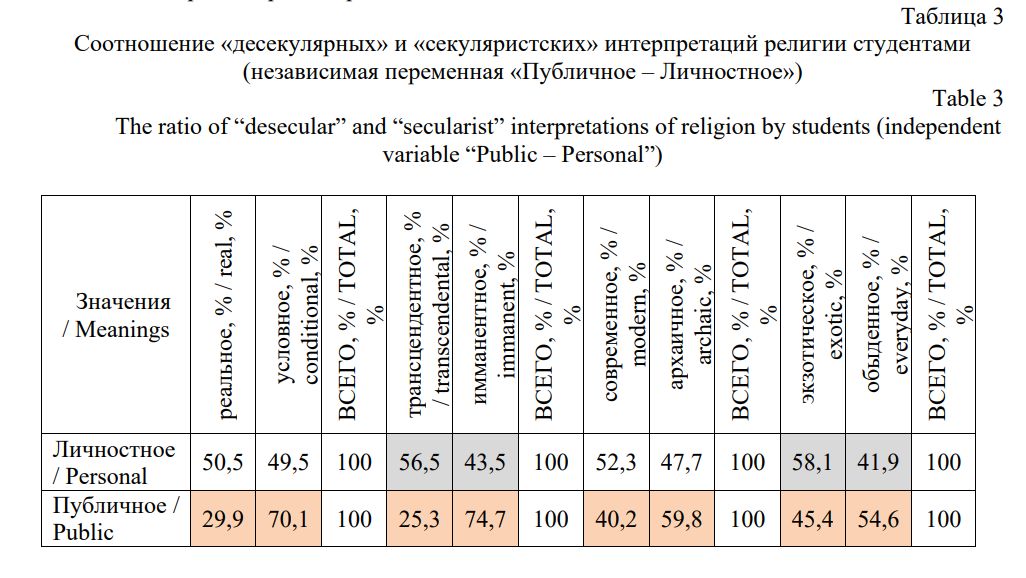
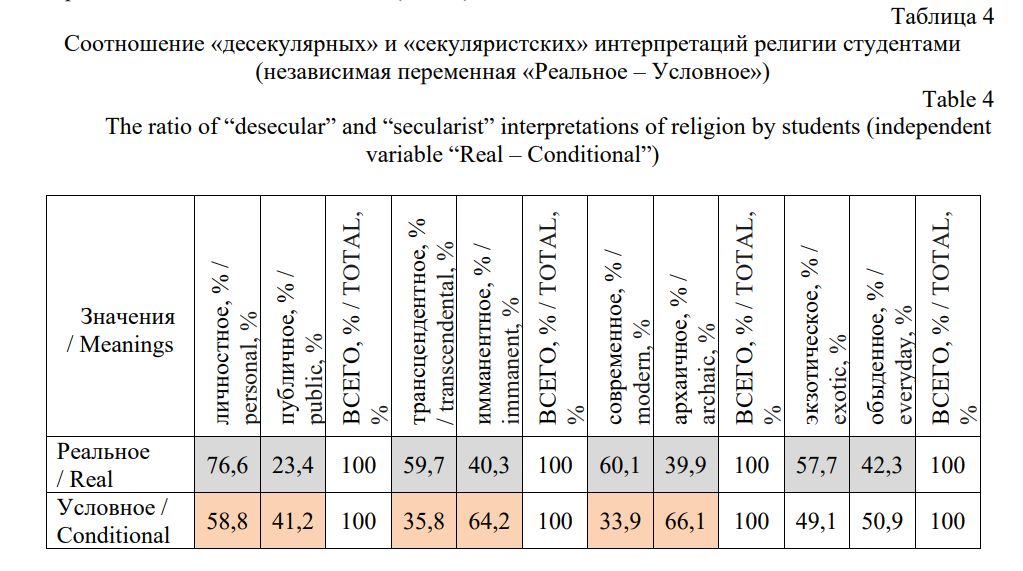
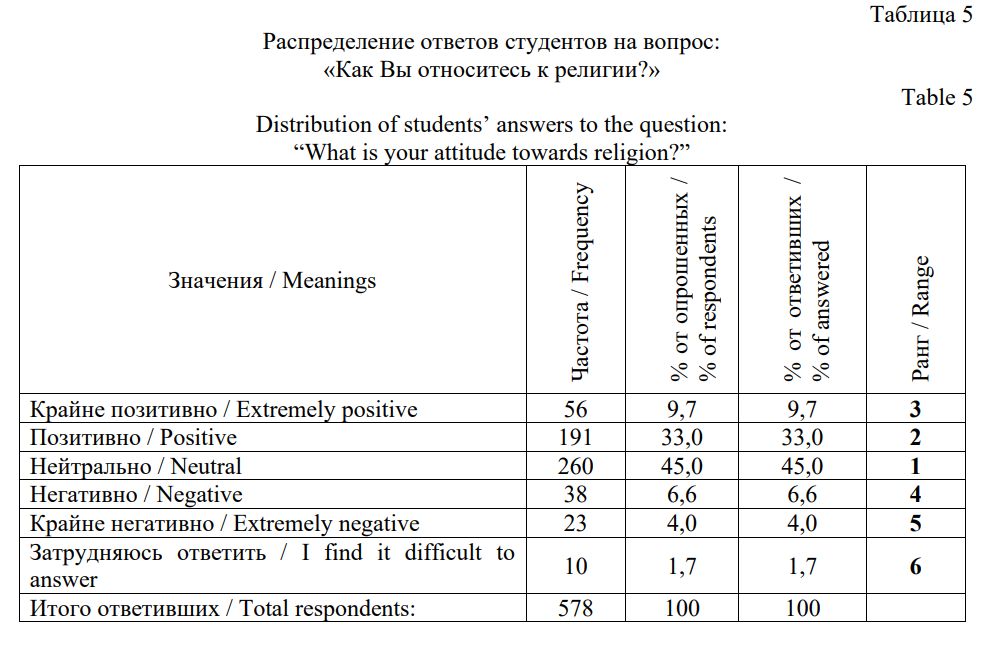
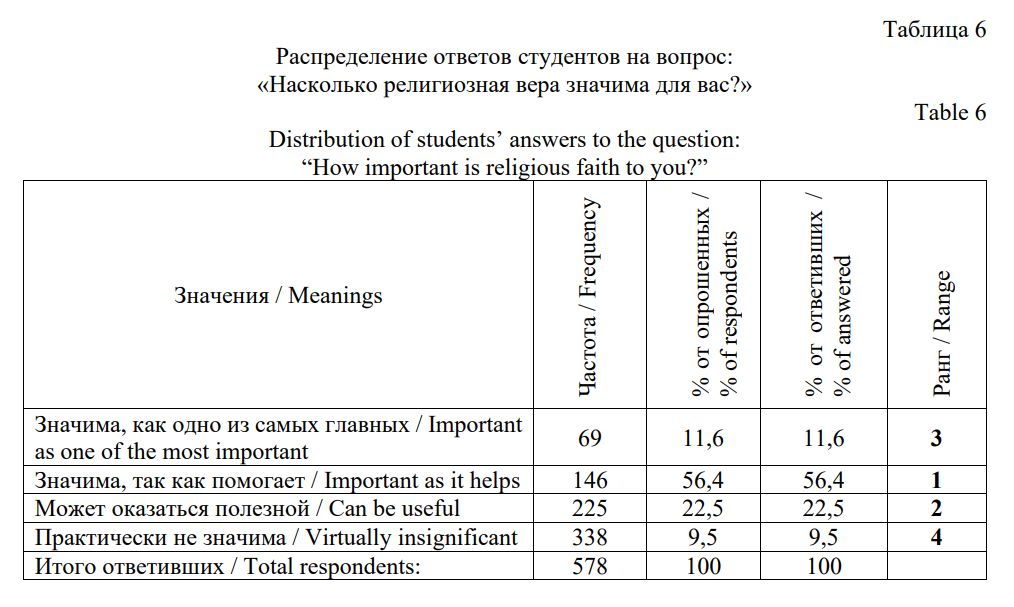
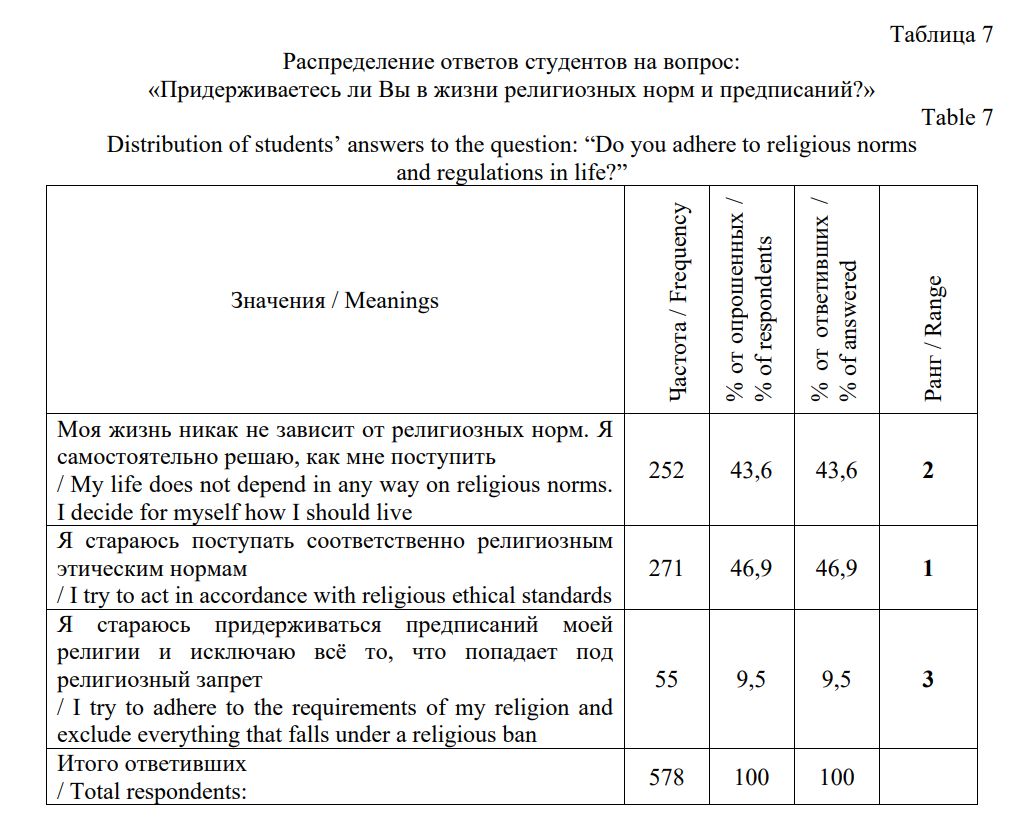
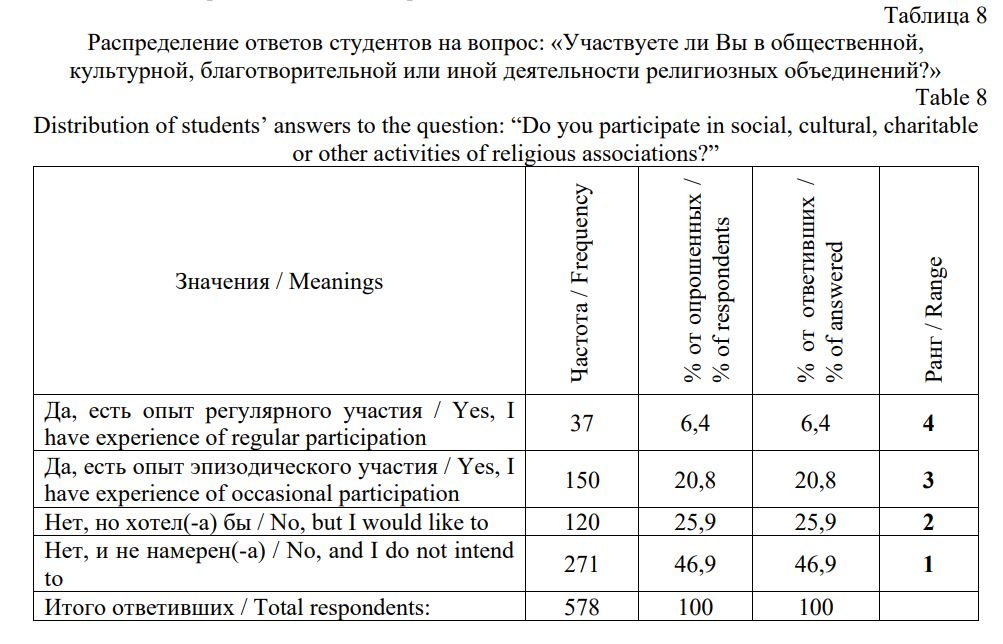
Lebedev, S. D., Shapovalova, L. V. (2024), “Religion through the eyes of Russian students”, Research Result. Sociology and Management, 10 (3), 52-71, DOI: 10.18413/2408-9338-2024-10-3-0-4.
Research result. Sociology and Management is included in the scientific database of the RINTs (license agreement No. 765-12/2014 dated 08.12.2014).
Журнал включен в перечень рецензируемых научных изданий, рекомендуемых ВАК


















While nobody left any comments to this publication.
You can be first.
Belyayeva, L. A., Zdravomyslov, A. G., Lapin, N. I., Naumova, N. F. (1996), Dinamika tsennostey naseleniya reformiruyemoy Rossii [Dynamics of the values of the population of reformed Russia], Editorial URSS, Moscow, Russia. (In Russian)
Zaslavskaya, T. I. (2005), “Human potential in the modern transformation process”, Obshchestvennye nauki i sovremennost, (3), 5-16. (In Russian)
Zimmel, G. (1996), Religiozny element v otnosheniyakh mezhdu lyudmi. Religiya i obshchestvo: Khrestomatiya po sotsiologii religii [The religious element in human relations. Religion and Society: A textbook on the sociology of religion], Sost. Garadzha, V. I., Rutkevich, E. D., Aspekt Press, Moscow, Russia, 209-226. (In Russian)
Kargina, I. G. (2024), “Religion and values as components of the human potential of society”, Research Result. Sociology and Management, 10 (1), 4-10. (In Russian)
Kargina, I. G. (2014), Sotsiologicheskie refleksii sovremennogo religioznogo plyuralizma [Sociological reflections of modern Religious pluralism], MGIMO – Universitet. Moscow, Russia. (In Russian)
Kisilenko, A. V. (2014), “Religious duty as a motive for youth volunteering”, Sotsiologiya religii v obshchestve pozdnego moderna. Sbornik statey po materialam IV Mezhdunarodnoy nauchnoy konferentsii [Sociology of religion in Late Modern society. Collection of articles based on the materials of the IV International Scientific Conference], 298-301. (In Russian)
Kublitskaya, E. A., Lebedev, S. D. (2022), “To analyze the religious situation in the Belgorod region”, Mir nauki. Sotsiologiya. filologiya. Kulturologiya, 13 (3), [Online], available at: https://sfk-mn.ru/PDF/46SCSK322.pdf. (Accessed 28 July 2024) (In Russian)
Lebedev, S. D. (2020), “Virtualization of the Religious community as a key to understanding the evolution of sociological concepts of religiosity”, Kontsept: filosofiya, religiya, kultura, 4(3), 85-104. (In Russian)
Lebedev, S. D. (2010), “The Paradoxes of Religiosity in the world of Late Modernity”, Sotsiologicheskie issledovaniya, (12), 81-90. (In Russian)
Lebedev, S. D. (2024), “Reflection of religion by modern Russian youth: towards the formulation of secondary hypotheses (based on materials from an interregional study)”, Research Result. Sociology and Management, 10 (1), 28-39. (In Russian)
Lopatkin, R. A. (1996), “Sociological study of the religious situation and state-Church relations”, Gosudarstvenno-tserkovnye otnosheniya v Rossii: Opyt proshlogo i sovremennoye sostoyanie, ed. by F.G. Ovsienko. M.I. Odintsov. N.A. Trofimchuk, Izd-vo RAGS, Moscow, Russia, 190-223. (In Russian)
Sotsiologiya Yadova: metodologicheskiy razgovor [Yadov's Sociology: A Methodological Conversation] (2019), Novy khronograf, Moscow, Russia. (In Russian)
Teylor, Ch. (2017), Sekulyarny vek [The Secular Age], BBI, Moscow, Russia. (In Russian)
Shapovalova, I. S. (2023), “Self-assessment of the financial situation and social strategies of youth”, Nauka. Kultura. Obshchestvo, 29(3). (In Russian)
Shapovalova, L. V. (2022), “Attitude to religion: sociological contexts of analysis”, Sotsiologiya religii v obshchestve pozdnego moderna, 11, 68-76. (In Russian)
Shyutts, A. (2003), Smyslovaya struktura povsednevnogo mira [The semantic structure of the everyday world], Fond «Obshchestvennoye mnenie», Moscow, Russia. (In Russian)
Khabermas, Yu. (2008), “Post-secular society – what is it?, Rossiyskaya filosofskaya gazeta, 5(19), 1-2. (In Russian)
Berger, P. L. (1999), The Desecularization of the World: Resurgent Religion and World Politics, Wm. B. Eerdmans Publishing Company.
Davie, G. (2002), Europe: The Exceptional Case: Parameters of Faith in the Modern World, London, Darton, Logman and Todd Ltd.